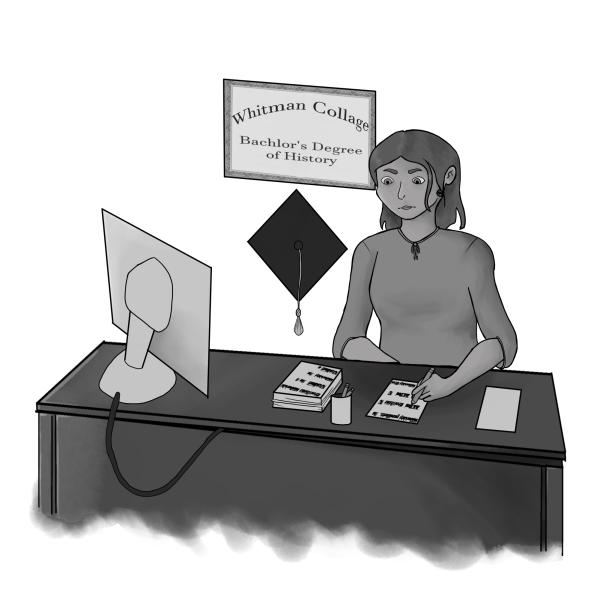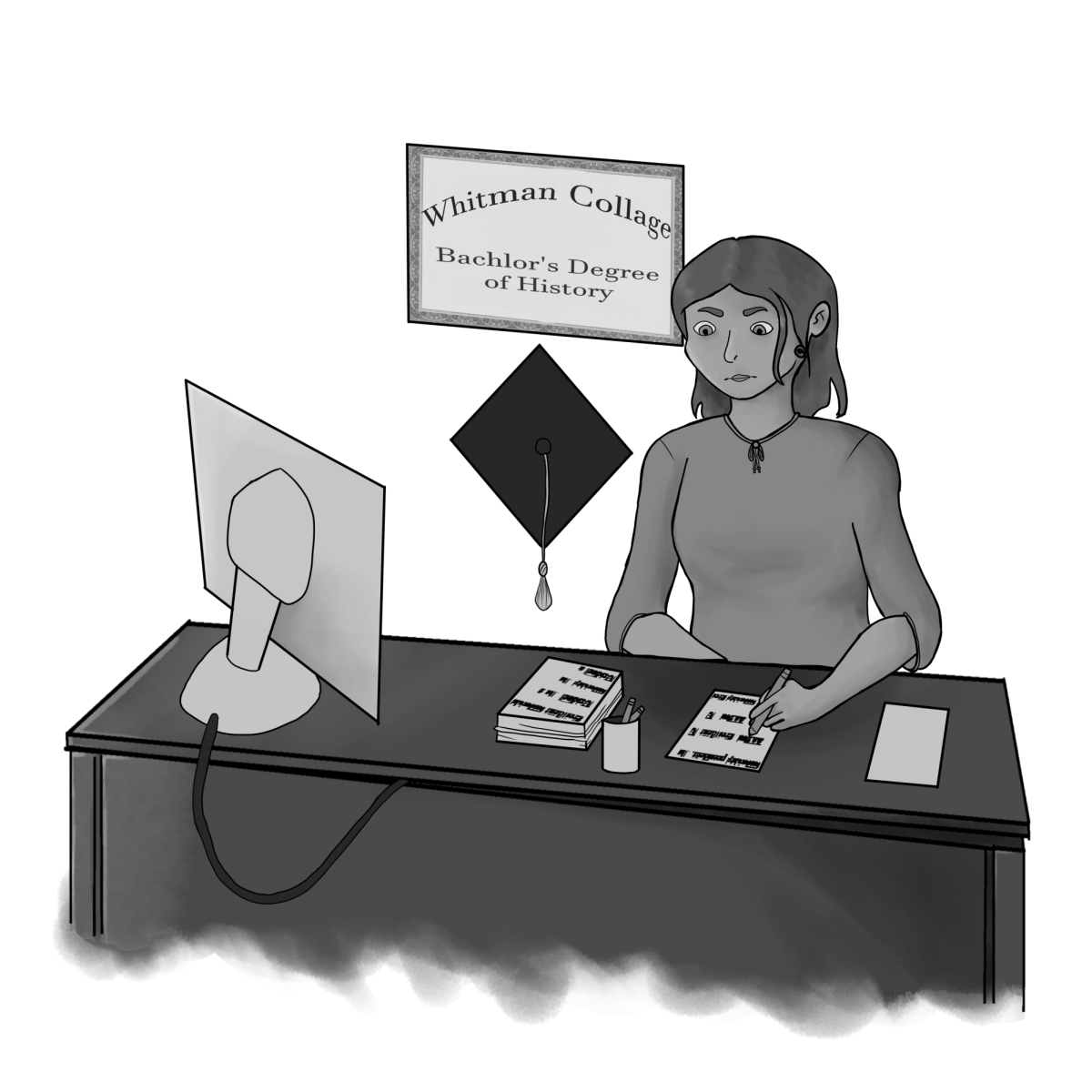Students across campus awoke on the morning of Sept. 3, 2024, as the Memorial Hall bell tower rang out– two minutes before the hour mark, of course. To many groggy students returning from a restful (or not-so-restful) summer, the bell was a familiar sound. But for the newly arrived first-year and transfer students, the sound marked the start of a years-long stay at the college. For many, these next few years will mark a vital period of learning and growth, after which they’ll go on to their respective careers elsewhere, returning for the occasional alumni reunion or nostalgia-driven visit. A select few students, however, will continue their journey at Whitman far after walking across the graduation stage on a scorching May afternoon, returning to the college years later as distinguished members of the staff. Cases such as these are not rare: as of March 2023, over a dozen professors and faculty members are Whitman College alumni.
Each Whittie-turned-professor’s time on campus occurred during dramatically different social, political, and cultural landscapes, and conversations with these alumni-turned-faculty reveal the similarities and differences in campus involvement, student life and everything in between.
Much of Whitman’s appeal when it came to these staff members attending and appreciating Whitman in the first place are the same reasons that they were happy to come back.
Assistant Professor of Hispanic Studies and member of the class of 2012 Aarón Aguilar-Ramírez reflects on his feelings about returning to Whitman.
“One of the things that struck me was how similar things were,” Aguilar-Ramírez said.
Aguilar-Ramírez went on to explain that more than just the physical campus remains comparable to its former self. The new student body felt very familiar to Aguilar-Ramírez despite his five-year gap without them.
Assistant Professor of Psychology Nancy Day, who graduated from Whitman in 2005 with a dual major in Psychology and Biology, shared a similar sentiment during a conversation with her. Professor Day praised a trend and culture of teamwork in the pursuit of success that she was glad to be a part of as a student, and now observes fondly as a faculty member.
“Whitman students are collaborative, not competitive,” Day said.
While pursuing her Ph.D. in Neuroscience at the University of Minnesota, Professor Day said that the differences in the way the social environment operated marked a stark contrast to the one found at Whitman, leaving her “fundamentally flummoxed”. She realized that she was better suited to an institution more similar to Whitman, but did not expect to return to teach here until she saw a job listing that lined up with her experiences and what she was searching for at the time.

Aguilar-Ramírez had always wanted to be a teacher of some sort. While on the job hunt toward the end of his graduate school career, the stars aligned, so to speak, in a way that opened up the opportunity for him to apply for his current position at Whitman.
The Whitman student body is known today to be very civically engaged and socially minded – these are values that have not faltered over time. Associate Professor of Astronomy, and the chair of the department Andrea Dobson graduated from Whitman with a Physics-Astronomy degree in 1982. Dobson attended back when The Wire was known as The Pioneer, the Outdoor Program went by the “Outing Program”, and long before Whitties were incessantly plagued by Duo Two-Factor Authentication on a regular basis. Professor Dobson recalled the wave of cultural changes the campus was determined to make during her tenure as a student.
“Students in the 70s and 80s were pushing for it to be ok to be gay or ok to accept a student of color into a Greek group,” Dobson said.
Although the topics often discussed among students and the goals attached to them have evolved overtime, one aspect of activism has stood the test of time – the student-run nature of these actions and movements.
Aguilar-Ramírez emphasized the ways in which Whittie-run activism manifested when speaking about the many social issues that were all the buzz during his time as a student. He said there was a large focus on immigration and undocumented students at the time. Aguilar-Ramírez also described a push by a panel of students that led to Whitman becoming the first liberal arts college to vocalize support of undocumented students on campus in a statement published in Fall 2011, according to an article published in The Wire at the time. Students during this time also worked to invite political figures to speak with the student population and bring awareness to broader issues. In one instance, students helped to bring Pramila Jayapal, U.S. representative and founder of immigrant advocacy group OneAmerica, to campus in November 2012. During her visit, she presented a talk titled “Building a Stronger Democracy: Immigration, Immigrants and the Future of America.”
Aguilar-Ramírez talked about the changes he’s noticed across the years when it comes to students’ social involvement.
“Between the time I was a student in the early 2010s and when I came back in the late 2010s, it seemed as if we had come full circle,” Aguilar-Ramírez said.
Despite some differences in the issues that were being discussed, Aguilar-Ramírez brought up the change in presidential administration as a key example.
“It seemed very familiar in the way Whitman students organized,” Aguilar-Ramírez said.
Progress was, of course, made through these initiatives, but Dobson also describes her view of recent actions on campus.
“In some ways, we have made huge strides in increasing diversity & inclusion, and in some ways, we still have a long way to go,” Dobson said.
Student-headed movements and groups have played a crucial role in the Whitman community because they not only affect administration and policies, but the students also help persuade their peers to attend, which can often be a double-edged sword.
Beyond the immediate campus community, Whitties nowadays are concerned with uplifting and working alongside the local Walla Walla community. At every Student Activities Fair and on every bulletin board on campus, posters are plastered up advertising Community Engagement Volunteer Programs such as Friends Rock and the Walla Walla Stream Team.
Day appreciates the efforts of the college to make these opportunities known and accessible to students, but she says that wasn’t always the case. During her time as a student in Walla Walla, Day worked as a Girl Scout Troop Leader. She enjoyed the way it connected her with the broader area, making her more aware and conscious of the differences between the atmosphere in the wider Walla Walla area and that of the glass bubble that is often responsible for insulating Whitman students, consequently preventing or discouraging engagement.
However, many other students did not seem to share the sentiment, at least not in the way they do today, opting instead for a “more focused campus experience”. As someone who attended Whitman as a student more recently, Aguilar-Ramírez might be expected to have a different answer.
“[Now there is a] very intentional institutional effort to build and strengthen ties within the Walla Walla community… in a way that wasn’t in place when I was a student,” Aguilar-Ramírez said.
Aguilar-Ramírez continued to emphasize the student-run nature of the community involvement events of years past, which, as he recalls, included a program called Teaching the Movement that taught the history of the U.S.’s Civil Rights Movement at elementary schools in the area, as well as outreach events at Walla Walla High School and local churches. This student-driven approach contrasts greatly with Whitman’s current administrative push to get students out into the community, reflecting a change in the goals of the administration rather than in the population itself.
Throughout the years, there have been many shifts within Whitman College as an institution, but, regardless of how their goals or administrative ambitions have changed, the spirit of the student body is a reliable, energized and passionate constant. And what about when it comes to Memorial Hall’s occasionally punctual and iconic bell tower?
Dobson expressed her opinion on the sporadic bell tower.
“It has always gotten off and periodically needs to be reset, yes,” Dobson said.







